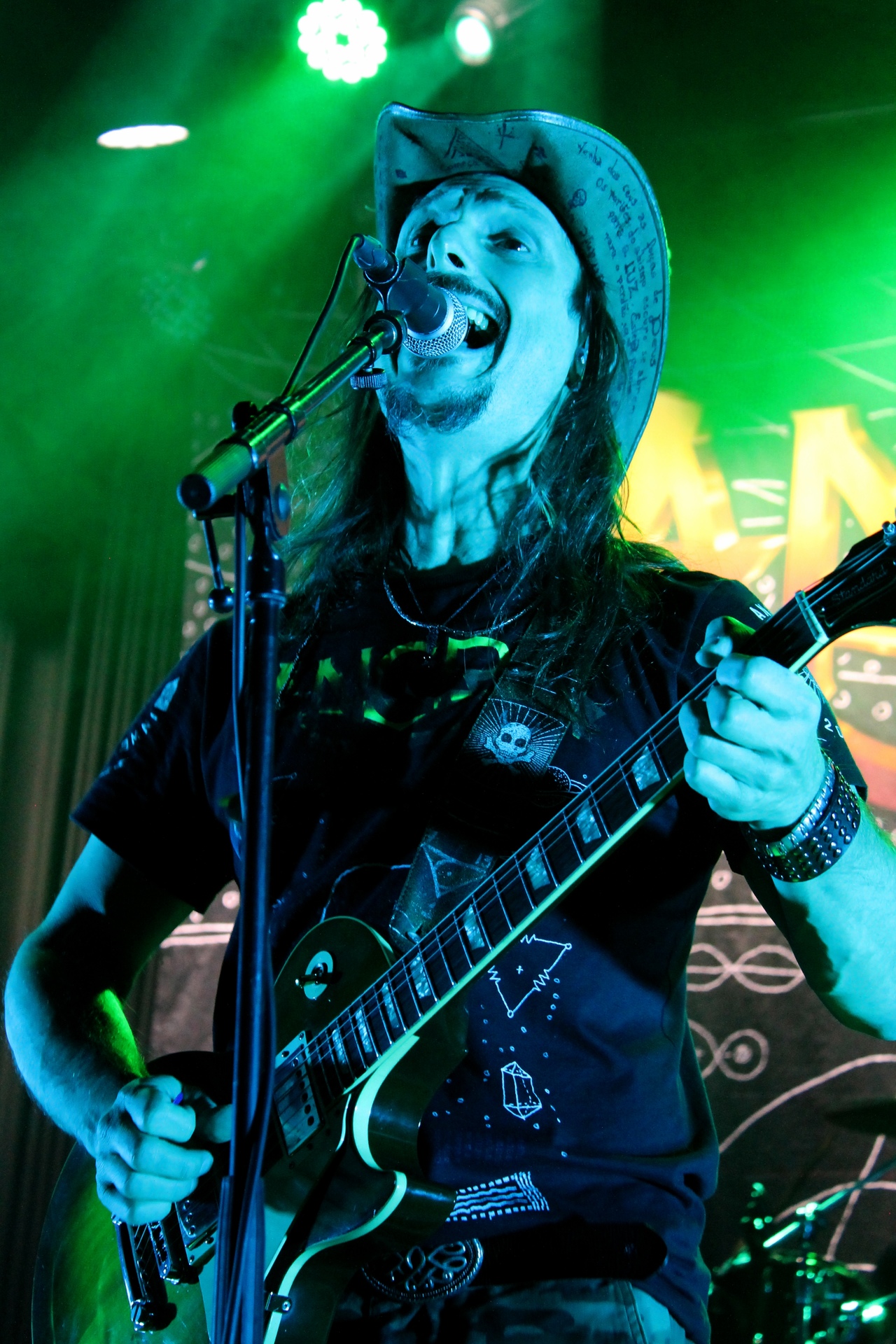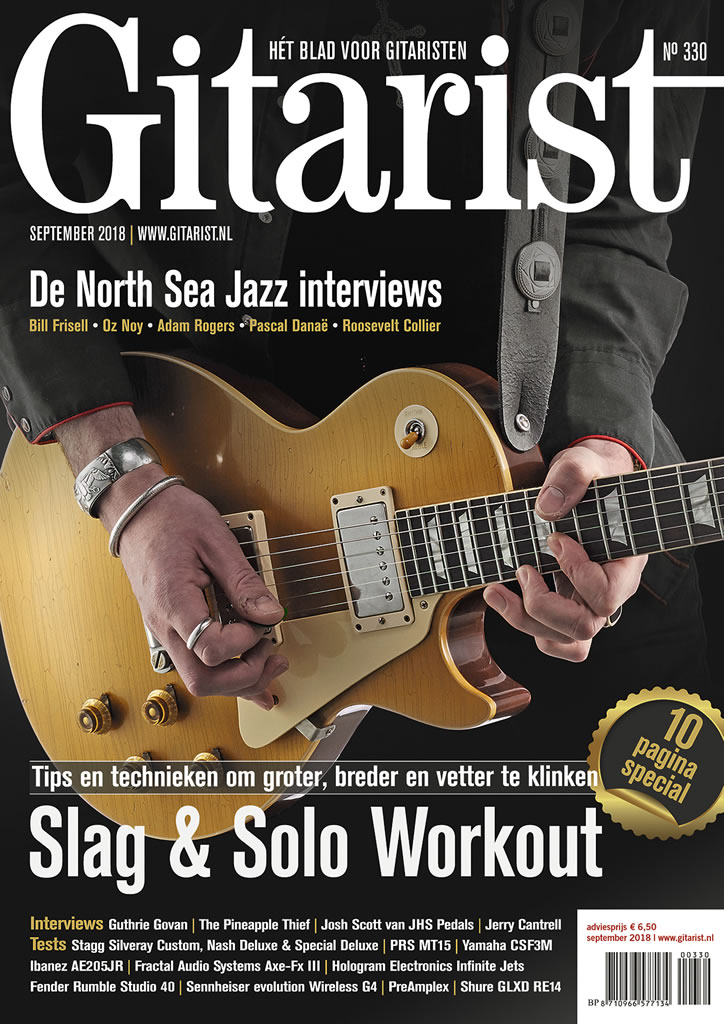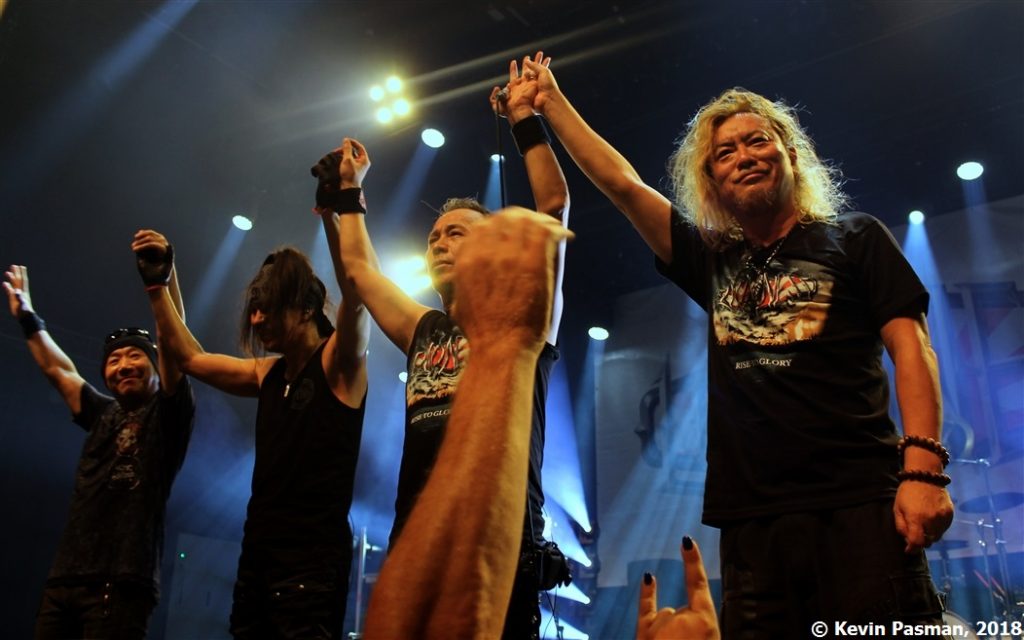
Some bands are irreparably damaged by change. Angra seems immune to that. In fact, through the years, line-up changes have only made the Brazilian quintet stronger. Losing their longtime guitarist Kiko Loureiro to Megadeth could have been disastrous, but their brand new album ‘Ømni‘ proves that Angra is still as inspired as ever. With influences from progressive metal and power metal to Brazilian music, the album is a masterclass in how versatile heavy metal guitar playing can be. The two guitarists responsible for this, bandleader Rafael Bittencourt and newcomer Marcelo Barbosa, guide us through the creation of the album.
“After Kiko left, I was a bit worried“, admits Bittencourt. “Kiko was not only an exceptional guitar player, but also my songwriting partner. I wanted someone to fill that spot. Because of that, everyone got involved with the songwriting. This album started from zero, with conversations of what the direction of the band should be. When we were touring with Tarja Turunen two years ago, we started jamming and exchanging ideas with small amps in the dressing room and backstage.
At the time, we were touring for the anniversary of our ‘Holy Land’ album, which allowed us to do a lot of research on that album together. Marcelo lives two hours away from where I live by plane and Fabio (Lione, singer) lives in Europe, so I was meeting with Felipe (Andreoli, bassist) and Bruno (Valverde, drummer) more often, but whenever we could, we would get together out in the woods for a couple of days. Just resting, chatting and exchanging ideas. Marcelo was showing me new bands and artists that I hadn’t really listened to, like Alter Bridge and Jeff Buckley, so we kind of exchanged influences as well. All of this has made ‘Ømni’ a very collective work.
I think that every time we changed members, the music changed a little bit. As a guitar player, Marcelo has a similar background to Kiko. They are both very technical and influenced by fusion players. Musically, however, it was a big difference, because Marcelo has a different way of doing things. The biggest difference was his energy, the way his personality balances with the group. He was the missing link that we needed to complete a very solid line-up.”
A lot of soul
“It is an honor and a pleasure for me to be in a band like Angra“, says Barbosa. “Not only because everybody respects the band around the world, but also because the atmosphere within the band is really good. Fabio, Bruno and I were encouraged to bring in ideas and we also had the chance to give our opinions about the ideas the other guys came up with. Because of that, I felt really free and respected by the other guys, which is of course a perfect situation for me.”
“I was familiar with some of the writing that Marcello has done in the past, especially what he did with Almah“, continues Bittencourt. “So I knew we would get the whole package from him. I wanted Marcelo to be a part of the songwriting process, but I didn’t know how his input would sound in the overall result. We had some structures and parts for solos, but I would only know what he had in mind when he was actually recording it. During the recording sessions, I was getting more and more impressed with him. Every time he would record a solo, he would do something different. He used a whole variety of phrases and sounds.
My first concern was to bring in someone very technical, so the audience would not miss Kiko. In the end, Marcelo did not only bring technique, but also a lot of soul. The stuff he plays is alive. I can feel it moving. This time, we were learning how to work together. Next time, everything will be different when we start the writing process, because now we know what to expect from each other. I can’t wait to create more guitar parts together. I think the guitar parts will be even richer next time.”
Fresh ideas
“For me, ‘Ømni’ represents a new era for the band“, explains Bittencourt. “Our third. This time, three of the guys are relatively new to the band, so they’re helping to create a new sound with new ideas. Bruno, for instance, is only 27 years old, the same age as the band. He is very excited to be in Angra, because here in Brazil, Angra represents pride, as we are one of the few Brazilian bands that are successful abroad. This excitement, combined with the experience that Felipe and I have in the band, brings a lot of fresh ideas to the table.

What we wanted ‘Ømni’ to do is to combine these fresh ideas with the long history of Angra. We wanted to wrap up our history style-wise, so we brought a little bit of power metal, a little bit of melodic metal, symphonic metal, progressive metal, Afro-Brazilian stuff, orchestral stufff with percussion… Everything that we have ever done in a fresh, new sound. And I think we really succeeded.
This is the best time I have experienced with the band. In the past, it has sometimes been very stressful and painful to record and release a new record. This time, it was smooth, easy, natural and organic. Ideas were flowing. We would be talking, laughing, stopping for coffee, come back and more ideas would flow. Before the album came out, we didn’t know if people would like it, but I knew it was our best work. Everyone was so talented and so creative. I love it when our problem is that we have two or three choruses in the same song. Not because we don’t have a chorus, but because we have two or three really good melodies. In that case, deciding which one is out is not stressful, it makes me happy.”
“We actually had almost an entire album of other songs“, smiles Barbosa. “We wrote about eight songs more than we have on the album. Sometimes you already have two prog songs and it would be too much if you add a third one to the album. The same goes for ballads, we already had two.”
“There is a whole soft song that was already prepared for the album“, agrees Bittencourt. “A really good song, but we already had a ballad and our producer Jens Bogren, who is a genius, did not want the album to become too soft. He wanted the record to be a little more aggressive, so it would make more of an impact. The whole song was out, so we can put it on our next one. There are also many ideas for songs; choruses, verses, riffs, instrumental parts… We don’t have to start from scratch next time.”
Nothing to lose
“I always write songs having the melody as a guideline“, Bittencourt shares. “Many times I start singing a melody, I add some rhythms to the melody and I won’t start adding the chords until the third stage. Therefore, singing is a natural thing for me. I like singing. Still, I think guitar players usually don’t sing as well as the lead singer, simply because of the position of the microphone. When you play, you want to watch the neck and you start worrying about what you’re doing. And worrying is never good, regardless of whether you’re singing or playing.
During the ‘Angels Cry’ anniversary, we had nothing to lose. Some people complained that we didn’t have Edu or André (Falaschi and Matos, former singers) with us, but when Fabio joined the band, we started researching new ways of interpreting our music. The audience knew that something different than what was previously done was coming up. That was a good moment for me to start singing, because everything would be new to the ears of the audience.
However, I was not going to be the lead singer, because that is a very hard task. We have very difficult guitar parts and difficult vocal melodies. And communicating with a crowd is also a big responsibility. I did not want to quit focusing on being the guitar player. I wanted to sing once in a while, when the songs are meaningful to me. Like ‘The Bottom Of My Soul’ on the new album. It’s a very personal song, so I decided with Fabio that I was going to sing it.”
Guitar scientist
“We started working with Jens Bogren with our last album ‘Secret Garden’“, says Bittencourt. “He brought a new concept for the guitar sounds. That was when I started to research new sounds and new equipment. In fact, it was Marcelo who made me aware of the fact that Kemper is very practical to work with. If I want to try an amp, I don’t need to buy it first. It really gave us the option to try out what is best for us with everything in the same box.”
“Our friends and us are always exchanging Kemper profiles, we literally have thousands“, explains Barbosa. “That’s why it’s always changing. Rafael and I extensively talked about guitar tones and exchanged sounds and ideas about our sound. We needed a really good set-up that was small and light to travel with and that we could use directly into the PA. Using the Kempers on stage is great for us, because we have tons of different sounds that we love. And we also have the option to not use a cabinet.”

“Marcelo is a guitar scientist“, admits Bittencourt. “He spends a lot of time on researching guitar sounds and learning different techniques, styles and phrases. He is a real perfectionist with every detail of playing guitar. I am a guitar lunatic. I’m much more intuitive. A part of the reason why I don’t spend the same amount of time on such things, is that I’m involved with every step of the production in Angra: the schedule, what we have for lunch when we are rehearsing and recording, hiring keyboard players, the orchestra and the percussionists. So when it comes to creating the guitar parts, my main resource is my intuition. However, I think this is very complementary. As a player, Marcelo is very intuitive as well.
My task in Angra productions is to capture everyone’s ideas and glue them together in a concept that makes sense. There’s classical parts, acoustic guitar sections, thrash metal riffs, a piano part, percussions… How to glue that together in a way that doesn’t feel like too many atmospheres into fifty minutes of music, that is my job. This time, it was a very easy task.”
Diversity
“Both of us started listening to Brazilian music before we even started playing the guitar“, says Bittencourt about the strong Brazilian influences on ‘Ømni’. “It’s our background, it’s in our veins. I think that all power metal bands should feel free to add some more diversity to their music, because the crowd is losing interest in power metal. It got so stiff and conservative that it is hard to create something engaging. Many power metal bands got so framed into a certain set of rules, that they all started to sound the same. Some of them sound as if they’re just following some rules instead of being creative. Kids grow up and get smarter. If you dumb their music down, they will lose interest at some point.”
Angra is currently on tour.
Listen to ‘Ømni’ on Spotify.



 Later on, we found out that they traded tapes with each other. Metallica’s drummer Lars Ulrich was one of those fanatic tape traders. He also already knew Bow Wow, for instance. There was even a record store in San Francisco that imported our lp’s. Their owner really helped us simply by playing our music to people who might be interested in us. That way, Loudness could already build an audience before we ever played in the States.”
Later on, we found out that they traded tapes with each other. Metallica’s drummer Lars Ulrich was one of those fanatic tape traders. He also already knew Bow Wow, for instance. There was even a record store in San Francisco that imported our lp’s. Their owner really helped us simply by playing our music to people who might be interested in us. That way, Loudness could already build an audience before we ever played in the States.”







